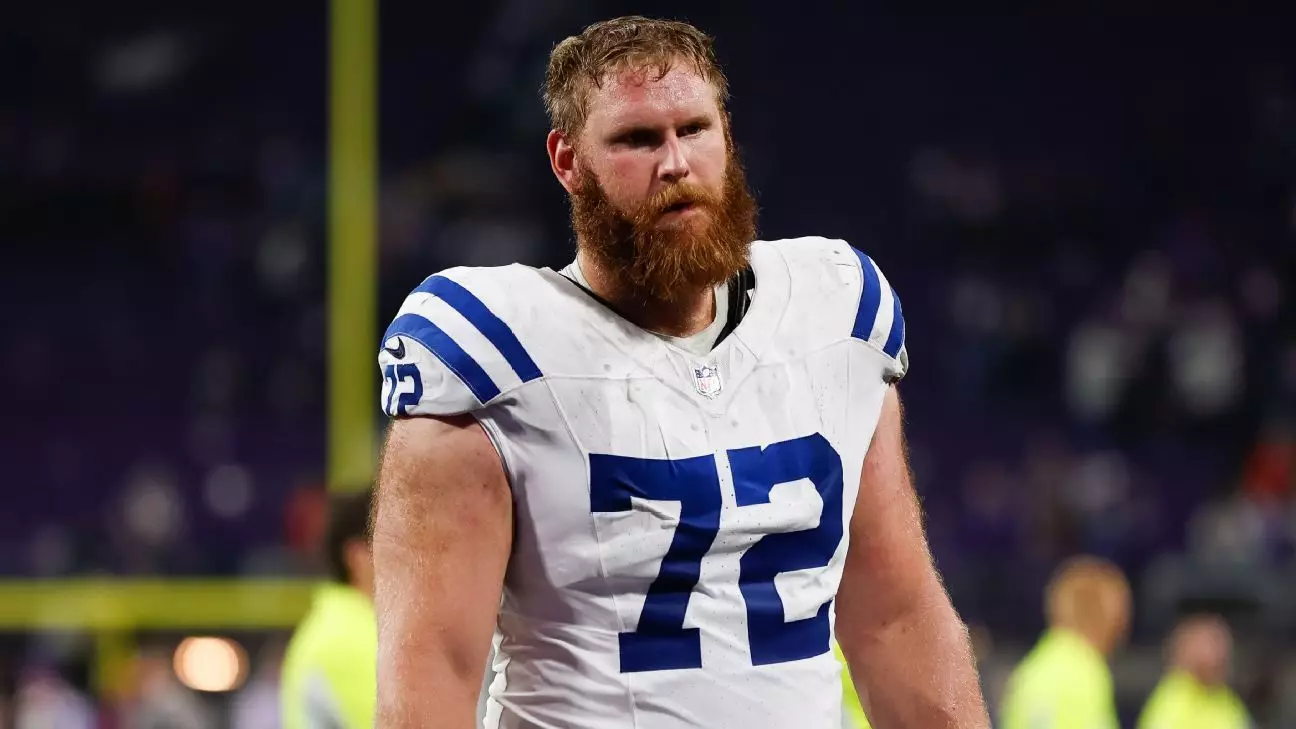In the high-octane world of the NFL, where physical strength and mental fortitude are paramount, it’s not uncommon to overlook the silent struggles faced by athletes. Braden Smith, the Indianapolis Colts’ seasoned offensive tackle, brought this reality into sharp focus when he opened up about his personal turmoil. Missing the final five games of the last season was not merely a decision based on strategy; it was an escape from an unbearable state of mind. Smith’s candid revelations reveal a layer of vulnerability that starkly contrasts the fierce persona typically associated with professional athletes.
A Devastating Diagnosis
Smith’s journey transcended the typical narratives often associated with injury or poor performance; he found himself battling obsessive-compulsive disorder (OCD), specifically a debilitating form called religious scrupulosity. This condition led to a paralyzing fear of spiritual failing, ensnaring him in a cycle of obsessive thoughts and compulsions that ultimately eclipsed his life. He openly admitted to contemplating suicide, underscoring the intensity of his ordeal. In an atmosphere where toughness is lauded, Smith’s struggles emphasize that mental health is not a weakness but a profound human experience that merits understanding and compassion.
Smith’s diagnosis reveals a nuanced aspect of mental wellness—one that intertwines faith with anxiety, a complexity that can drive individuals to the brink. The International OCD Foundation outlines how religious scrupulosity manifests itself, revealing an alarming trend that often goes unnoticed in society. Athletes, like anyone else, can be susceptible to debilitating mental health conditions, showcasing that vulnerability exists beneath the surface of an individual who appears to have it all.
A Desperate Search for Solutions
After recognizing the severity of his issues, Smith sought help, initially through traditional avenues of therapy. However, despite his best efforts, progress was minimal, leaving him feeling trapped in his own mind. This led him to a radical and controversial course of action—seeking treatment with ibogaine, a psychedelic drug known for its potential in treating various mental health issues. His decision to travel to Mexico for this treatment, while not legally sanctioned in the U.S., underscores the desperation felt by many who grapple with chronic mental illness.
The journey into psychedelics speaks volumes about the broader mental health crisis permeating both society and sports. As stigma around mental health continues to wane, Smith’s experience raises an important dialogue about alternative treatments that may lie outside conventional approaches. The personal gamble he took exemplifies a critical juncture where the desperate seek any available remedy, which highlights a gap in traditional mental health care and the need for holistic approaches.
The Road to Recovery and Renewal
Despite the tumultuous path that led him to this point, Smith emerged with a renewed perspective on life and football. His account of no longer engaging in compulsive prayers or spending exhaustive hours in his mind is a testament to his healing journey. This transformation reveals how mental wellness can lead not only to personal recovery but also active engagement with one’s surroundings and responsibilities.
Importantly, Smith seeks to reclaim his identity—not merely as an athlete but as an individual capable of nurturing relationships with his family and community. His journey serves as a beacon of hope for countless others trapped in their mind’s labyrinth, advocating the message that recovery is possible, and seeking help is not a sign of weakness but of strength.
A New Chapter for Braden Smith
The Colts have rallied around Smith, recognizing both his talent and his resilience. The transformation in his life and career aligns with broader themes in professional sports, where mental health advocacy is gaining momentum. Smith’s decision to return with a restructured contract, willingly lowering his salary, indicates a deeper commitment to his team and the unfinished business he feels.
His story carries immense weight not only for his teammates but also for fans and those battling their own private struggles. By choosing to speak out about his mental health challenges, Smith is not just sharing his story; he is reshaping the narrative around mental illness in athletics. This willingness to be open and vulnerable breaks down barriers, encouraging others to confront their challenges and push through the darkness, leading to a culture that values mental wellness as much as physical prowess.

